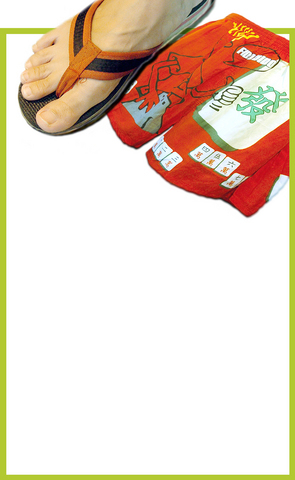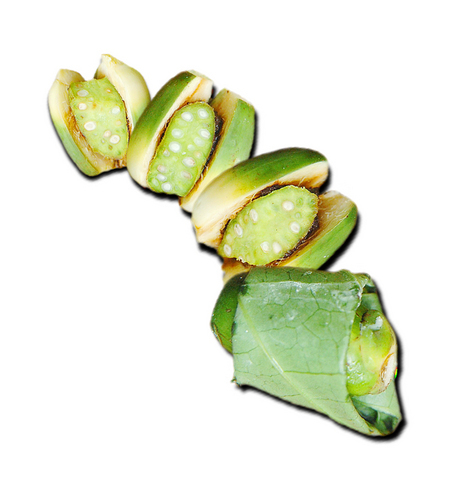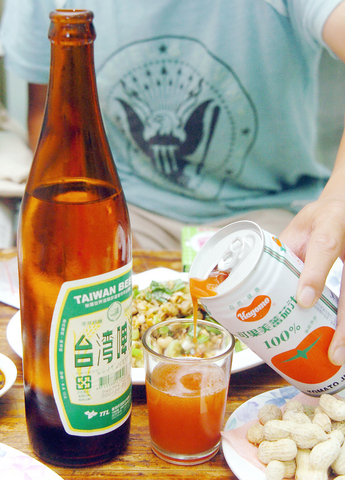A woman walks into a 7-Eleven wearing plastic slippers, jeans under a short skirt, an "Abibas" shirt and her motorcycle helmet. She purchases a bottle of rice wine, several cans of Vitali, and a pack of Long Life cigarettes, gets on the back of a scooter already occupied by three family members and rides away.
Though this scenario is an imagined one, it's no stretch of the imagination. It is a stereotypical look at the habits of a few Taiwanese people's habits and behavior. This was sometimes encapsulated by the term taike (
But while the slight hasn't completely lost its sting, it has been soothed by the surging popularity of Taiwanese culture. "Taike" has entered the lexicon of cool.

PHOTOS: CHANG CHIA-MING, TAIPEI TIMES
In their current issue, the editors of Eslite Reader (
It claims taike as a term is not anti-Taiwanese, but instead can be embraced as an integral part of local culture and another aspect of bentuhua (
"Some people have told us that if we talk about it, we're still making fun of it," said Sophie Chiang (

It wasn't always thus. When the KMT supporters first arrived in the country they were often ostracized by locals who felt oppressed by the government that had taken charge of the island. The KMT supporters, many of them soldiers, were seen by Taiwanese as tang shan zi (
To the new arrivals, locals became taike, literally "Taiwanese guests." This was the sociopolitical pressure cooker that would simmer and occasionally come to boil over the next decades, alleviated by the end of martial law nearly 20 years ago and democratization.
To what degree time has tempered those ill feelings depends on who you ask, but it has certainly altered the semantics of the situation. For today's generation of young people in particular taike is more likely to be used playfully, rather than used as an insult.

It has even been co-opted by some who embrace the stereotypes. Wu Peng-feng (
"It depends on who's talking and how they say it," he said. "If it's a young person, they probably don't mean it as an insult. But if it's an older person, it could be impolite. It depends on their tone."
Like others interviewed for this article, Wu shied away from offering a description of the term, saying instead that one simply knows it when one sees it.
Examples that were offered by others included: The cup wedged between the seats of a cab for the driver to spit betel nut; watermelon dipped in soy sauce and wasabi; the ubiquitous sausage-seller; hometown rock hero Wu Bai's (
Chiang said their decision to write about "new taike", as they call it, was based in part on the many Web sites that discuss the stereotypes.
"Some [of the Web sites] say it's discriminatory and other say it's still a little bit insulting," she said. "But at the same time there are celebrities who imitate taike." Rather than making fun, she said, they're emulating attributes they find cool.
Advertising, too, has targeted the stereotypes to sell everything from energy drinks to banking services.
"Taike is being released from its stereotypes and becoming a lifestyle term," Chiang said. "To embrace it, you maybe accept a more liberal lifestyle or you are bolder or braver. ... It's about the power of naming and identity," she said, and the fact that we control what words mean.
Still, there are places where plastic slippers aren't seen as a fashion statement. Signs outside nightclubs often proscribe chewing betel nut or blowing whistles and warn that anyone wearing slippers will be refused entry.
Chiang prefers to see the current debate in a broader context. Despite Taiwan's 400 years of history, she said, colonization and political upheaval have made for interesting times.
"Everything has happened here very quickly," she said. "The essence of being Taiwanese is change. Taike, too, is changing in context."
△ Look for the Taike Rock and Roll Concert (台客搖滾演唱會) to take place on Aug. 19 and Aug. 20 at the Taipei International Convention Center, with headliners Wu Bai and China Blue, MC Hotdog, Zhang Zhen-yue (
△ For more information on tickets and what it means to be taike, visit http://www.bcc.com.tw/all_net/news/tsong/tsong.htm.

April 14 to April 20 In March 1947, Sising Katadrepan urged the government to drop the “high mountain people” (高山族) designation for Indigenous Taiwanese and refer to them as “Taiwan people” (台灣族). He considered the term derogatory, arguing that it made them sound like animals. The Taiwan Provincial Government agreed to stop using the term, stating that Indigenous Taiwanese suffered all sorts of discrimination and oppression under the Japanese and were forced to live in the mountains as outsiders to society. Now, under the new regime, they would be seen as equals, thus they should be henceforth

Last week, the the National Immigration Agency (NIA) told the legislature that more than 10,000 naturalized Taiwanese citizens from the People’s Republic of China (PRC) risked having their citizenship revoked if they failed to provide proof that they had renounced their Chinese household registration within the next three months. Renunciation is required under the Act Governing Relations Between the People of the Taiwan Area and the Mainland Area (臺灣地區與大陸地區人民關係條例), as amended in 2004, though it was only a legal requirement after 2000. Prior to that, it had been only an administrative requirement since the Nationality Act (國籍法) was established in

With over 80 works on display, this is Louise Bourgeois’ first solo show in Taiwan. Visitors are invited to traverse her world of love and hate, vengeance and acceptance, trauma and reconciliation. Dominating the entrance, the nine-foot-tall Crouching Spider (2003) greets visitors. The creature looms behind the glass facade, symbolic protector and gatekeeper to the intimate journey ahead. Bourgeois, best known for her giant spider sculptures, is one of the most influential artist of the twentieth century. Blending vulnerability and defiance through themes of sexuality, trauma and identity, her work reshaped the landscape of contemporary art with fearless honesty. “People are influenced by

The remains of this Japanese-era trail designed to protect the camphor industry make for a scenic day-hike, a fascinating overnight hike or a challenging multi-day adventure Maolin District (茂林) in Kaohsiung is well known for beautiful roadside scenery, waterfalls, the annual butterfly migration and indigenous culture. A lesser known but worthwhile destination here lies along the very top of the valley: the Liugui Security Path (六龜警備道). This relic of the Japanese era once isolated the Maolin valley from the outside world but now serves to draw tourists in. The path originally ran for about 50km, but not all of this trail is still easily walkable. The nicest section for a simple day hike is the heavily trafficked southern section above Maolin and Wanshan (萬山) villages. Remains of